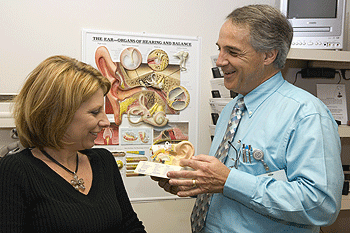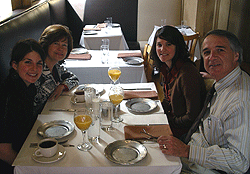Michael Valente, Ph.D., professor of otolaryngology, tells a story that perfectly illustrates the Zen adage, “When the student is ready, the teacher appears.”
One evening back in the early 1970s, he was sitting alone in a bar on Long Island, N.Y. “I must have looked sad or pensive,” Valente says. A fellow patron at the bar looked over and asked what was wrong. “I told him, ‘Oh, I’m pursuing a law degree, but I’m not sure I really want to be a lawyer.'”

The man started talking about his work — he directed a speech and hearing clinic at Nassau County Hospital, one of the largest hospitals on Long Island. He invited Valente to visit the clinic.
“When he was explaining what he did, it sounded interesting,” Valente says. “So I went down to the clinic. I spent the whole day there, and I found it really fascinating. He gave me some information on how to pursue a career in the field.”
The chance meeting sent Valente down a new path, one that’s led him to become director of the Division of Adult Audiology in the Department of Otolaryngology.
Valente left his law studies soon after the Nassau County Hospital tour and attended nearby Adelphi University on a scholarship. There, he earned a master’s degree in audiology, a branch of medicine that treats hearing loss. After finishing the program, Valente, who describes himself as a perpetual student, pursued a doctorate in audiology at the University of Illinois.
Valente was a professor at Central Missouri State University and at the University of Missouri-Columbia. In between these two appointments, he worked for the Veterans Administration (VA) in Omaha, Neb., and in Atlanta.
But 20 years ago, he accepted a position at the School of Medicine, and the move to St. Louis has proven an excellent one.
Sitting in his 11th-floor office in the Center for Advanced Medicine (CAM) where east-facing windows provide a panoramic view of the Gateway Arch and the Medical Campus, Valente says, “I wear four hats: I administer our three offices, I conduct research on hearing-aid technology, I see patients and I teach — and I love every bit of it.”
The Adult Audiology program has offices in the CAM, at the Central Institute for the Deaf (CID) and in Creve Coeur, Mo. The medical school is one of the largest sites for audiology training in the country.
“Mike will do anything to pitch in and help,” says Richard A. Chole, M.D., Ph.D., the Lindburg Professor and head of the Department of Otolaryngology and professor of molecular biology and pharmacology. “He’s a great team player, and our department has definitely benefited from that. He has established an extremely high- quality audiology program here, and we are fortunate to have him as a world leader in audiology care and research.”

Valente was on staff when Chole joined the department nine years ago, and Chole says, “He taught me the ropes.” He says Valente also provided strong support when Chole was working to integrate CID programs, including its hearing research, adult clinical care and advanced-degree programs, into the otolaryngology department. That alliance was approved in 2003.
Diane Duddy, whom Valente calls his second-in-command, says she has been delighted to work with him since 1995. Duddy is a clinical audiologist supervisor in the division and helps administer the clinics.
“Dr. Valente is a wonderful, encouraging person,” Duddy says. “It’s clear that he values the opinions of all the audiologists on the staff, and he’s very conscientious about making sure they have opportunities in all aspects of the profession. Moreover, he’s strongly committed to providing excellent and nationally renowned patient care.”
Helping hear
In the clinics, Valente sees patients with varying types of hearing loss. A lot can go wrong with the ear — wax builds up, tiny bones in the ear grow stiff, an eardrum becomes punctured, the sound-sensing cilia in the inner ear get damaged or the nerves that carry sound information to the brain weaken.
In fact, about a third of people age 65-75 and up to half of those older than 75 have some hearing loss. Valente and his staff work with physicians to identify the underlying cause of the problem so the appropriate treatment can be implemented.
Sometimes, the solution is surgical; sometimes, a drug can improve hearing. But usually what a patient needs is a hearing aid.
And that’s where Valente focuses much of his attention — his specialty is amplification of sound with hearing aids.
“Hearing aids have changed dramatically in the past 10 years, and now every three to six months, we have a major refinement of the technology,” Valente says. “My own research has been in hearing amplification and how to better fit hearing aids to patients. I’m constantly working to keep up with the technology and testing it to see if new developments really do improve sound quality and speech intelligibility.”
People can lose hearing in the upper, lower or middle ranges of the auditory spectrum.
Hearing tests measure that loss and indicate to the audiologist the kind of hearing aid needed and the settings it should use — that’s what audiologists call “fitting a hearing aid.”
|
Michael Valente Family: Wife, L. Maureen Valente, Ph.D., director of audiology studies for the Program in Audiology and Communication Sciences and assistant professor of otolaryngology; children, Michelle, 28, and Anne, 25. “My wife is much brighter than I am,” Valente says. “Recently, she earned her doctorate in audiology while working full time at Saint Louis University, which is quite an amazing feat.” Hobbies: Running, biking, taking long walks with his wife and watching “American Idol” and “24.” If he’s traveling on a night “American Idol” airs, he’ll log on to the Web site to see who’s been voted off. Professional contributions: Valente has written 10 audiology textbooks and is a reviewer for four medical journals. |
But, Valente points out, it’s also critical to then measure the sound in the ear of the patient while he or she wears the hearing aid and make further adjustments — a step that may be omitted at other hearing clinics.
The complexity of fitting hearing aids often leads to a poor fit, so while hearing-aid technology is much better than in the past, that doesn’t mean patients always get the full benefit.
“If you went to 10 different places in the United States to have a hearing aid fitted, you would be fitted 10 different ways,” Valente says.
Such inconsistency induced Valente to take on chairing a national task force with the American Academy of Audiology.
The job entailed three years working to establish a national guideline for fitting hearing aids in adults.
The task force published its results in 2006.
Valente may not have imagined himself influencing medical policy on a national level when he was a law student pondering his future in a bar on Long Island.
“But I’m still the same person as I was at Central Missouri State and at the VA,” Valente says. “I had things I wanted to do then, but the environment wasn’t there to help me get them done. Here I’ve had incredible resources that have allowed me to accomplish what I have. Importantly, the department chairs I’ve worked with, Dr. John Fredrickson and now Dr. Chole, have been terrifically supportive.”
No longer Italian
Valente is such a forthright, candid person that it’s surprising how mysterious his background is. At age 3, he wound up in an orphanage for reasons he still doesn’t fully understand.
“There was a tragedy in the family, but to this date, I don’t know what it was,” he says. “But I know my parents couldn’t take care of the four of us — three boys and a girl — so we were sent to an orphanage.”
When he was 8, Valente went into the foster-care system and grew up in several foster homes in Brooklyn, N.Y., and Long Island. Not knowing much about his family history, he assumed his name was of Italian origin. Then, two years ago while writing his autobiography — “for my beautiful wife and two beautiful daughters,” he says — he looked up his parent’s records on Ellis Island, a major portal for immigrants from 1892-1954.
“I found out I’m not Italian, I’m Portuguese — my father came from Portugal!” Valente exclaims. “For 58 years, I’m telling everybody I’m Italian. My daughters cracked up when I told them. They said they were going to have to get rid of their ‘I’m proud to be Italian’ T-shirts.”
Valente can now laugh about his past and expresses no bitterness. “It shows you can overcome adversity,” he says. “You can have a tough upbringing, but it doesn’t mean you can’t succeed.”